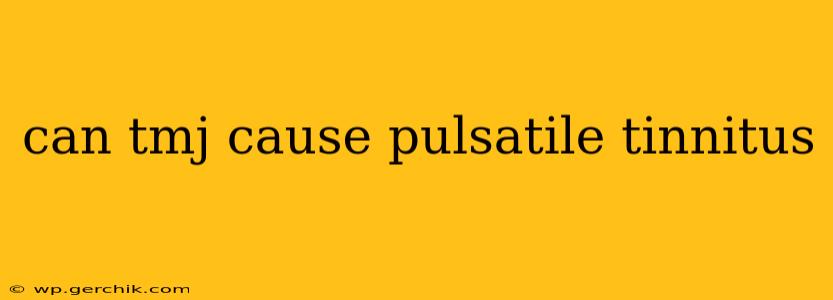Temporomandibular joint (TMJ) disorders and pulsatile tinnitus can sometimes coexist, leading many to wonder if one causes the other. While a direct causal link isn't definitively established by all research, the close proximity of the TMJ to the structures involved in hearing and the complex interplay of nerves and blood vessels suggests a potential relationship. This article explores the connection, examining the evidence and addressing common questions.
What is TMJ?
The temporomandibular joint (TMJ) is the jaw joint connecting your jawbone to your skull. TMJ disorders, or TMDs, encompass a range of conditions affecting this joint, causing pain, clicking, popping, and limited jaw movement. These disorders can arise from various factors, including stress, injury, arthritis, and bruxism (teeth grinding).
What is Pulsatile Tinnitus?
Pulsatile tinnitus is a type of tinnitus where the sound is perceived as rhythmic and synchronized with the heartbeat. It's often described as a whooshing, throbbing, or pulsing sound in one or both ears. Unlike the more common non-pulsatile tinnitus, pulsatile tinnitus is often linked to vascular or anatomical issues near the inner ear.
Can TMJ Disorders Directly Cause Pulsatile Tinnitus?
The answer isn't a simple yes or no. While not all researchers agree on a direct causal relationship, several mechanisms suggest a potential link:
-
Vascular Compression: The TMJ's close proximity to blood vessels supplying the inner ear means that joint dysfunction, inflammation, or malposition could potentially compress these vessels. This compression might alter blood flow, leading to pulsatile tinnitus.
-
Neural Irritation: The trigeminal nerve, responsible for sensation in the face and jaw, also plays a role in hearing. TMJ disorders can irritate this nerve, potentially leading to the perception of pulsatile sounds. This neural pathway could transmit altered sensory information to the brain, interpreted as tinnitus.
-
Muscle Spasms: Muscle tension in the jaw (a common symptom of TMD) can spread to surrounding muscles, potentially affecting the blood vessels near the ear and contributing to pulsatile tinnitus.
How are TMJ and Pulsatile Tinnitus Diagnosed?
Diagnosing both conditions requires a thorough evaluation. For TMJ disorders, a doctor will likely examine your jaw's range of motion, palpate the joint for tenderness, and may order X-rays or imaging studies. For pulsatile tinnitus, audiologists will conduct hearing tests and physical examinations. In some cases, imaging techniques like MRI or CT scans may be necessary to rule out vascular abnormalities.
What are the Treatment Options?
Treatment for TMJ-related pulsatile tinnitus usually focuses on managing both conditions simultaneously. Treatment may include:
-
TMJ Management: This could involve physical therapy to improve jaw mobility, pain management medication (like NSAIDs or muscle relaxants), splints or mouthguards to reduce teeth grinding, and/or lifestyle changes to reduce stress.
-
Tinnitus Management: Treatment for pulsatile tinnitus focuses on addressing the underlying cause. This could involve medication to control blood pressure or other vascular issues, or surgical intervention in cases of vascular compression. Tinnitus retraining therapy (TRT) may also be helpful in managing the perception of the sound.
Can Stress Exacerbate Both TMJ and Pulsatile Tinnitus?
Yes, stress can significantly worsen both TMJ disorders and tinnitus. Stress can lead to increased muscle tension in the jaw, exacerbating TMJ pain and potentially contributing to vascular compression and nerve irritation, ultimately worsening pulsatile tinnitus. Stress management techniques like yoga, meditation, and mindfulness are therefore often recommended as part of a comprehensive treatment plan.
Is Pulsatile Tinnitus Always Related to TMJ?
No. Pulsatile tinnitus has many potential causes, and TMJ is only one possibility. Other causes include high blood pressure, vascular malformations, tumors, and even certain medications. A thorough medical evaluation is essential to determine the underlying cause.
Conclusion:
While a definitive causal link between TMJ and pulsatile tinnitus remains a topic of ongoing research, a strong correlation exists. The close anatomical relationship and potential for vascular compression and neural irritation suggest a potential connection. If you experience both conditions, consulting with a healthcare professional for a proper diagnosis and comprehensive treatment plan is crucial. This plan would address both the TMJ disorder and the pulsatile tinnitus to provide optimal management and relief.
